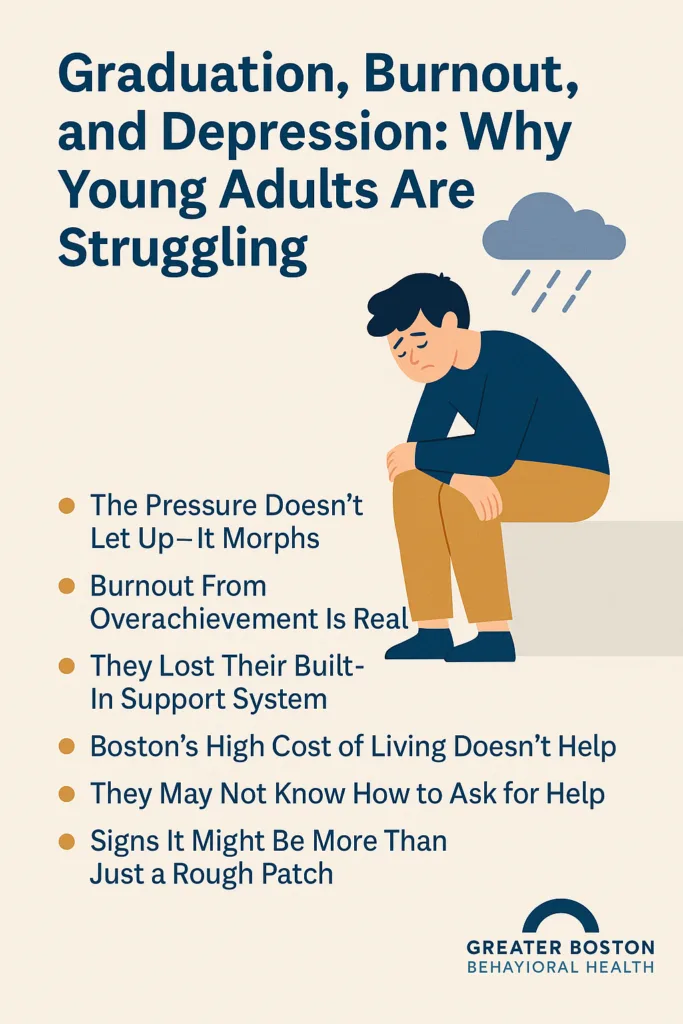When your child walked across that graduation stage, you hoped the hardest part was behind you. But instead of stepping into joy or purpose, they’re… floundering. Burned out. Distant. Maybe even depressed.
As a counselor, I’ve seen how often parents feel blindsided when their young adult hits an invisible wall after school ends. If you’re seeing troubling shifts—withdrawn behavior, anger, apathy—you’re not imagining it. You’re not alone.
Here’s why so many young adults are struggling—and what you can do to help.
1. The Pressure Doesn’t Let Up—It Morphs
Graduation is framed as a finish line. But for many young adults, it’s just the beginning of a quieter, more confusing pressure. The “what now?” settles in fast. Expectations to land a job, start a career, or move out can feel crushing—especially if they’re still figuring out who they are.
“He graduated with honors. Now he won’t get out of bed.” – Parent, 2024
This kind of shift isn’t about laziness. It can be the early signs of depression or a stress-related shutdown.
2. Burnout From Overachievement Is Real
Many students pushed themselves to the brink to make it through high school and college—AP classes, extracurriculars, part-time jobs, internships. The cost often doesn’t hit until afterward. When the adrenaline fades, exhaustion creeps in.
Burnout isn’t just tiredness. It’s a total depletion—emotional, physical, cognitive. It leaves them unable to enjoy rest and unable to gear back up. Depression often grows in that gap.
3. They Lost Their Built-In Support System
College provided structure: scheduled classes, built-in friendships, staff support. Life after graduation is often less social, more uncertain. Even young adults with jobs and apartments can feel untethered.
This lack of day-to-day community and purpose can worsen mental health symptoms—especially for those already predisposed to depression.
4. Boston’s High Cost of Living Doesn’t Help
In cities like Boston, young adults are not only navigating emotional overwhelm, but also high financial pressure. Rent, student loans, and competitive job markets create an ongoing background stress that’s hard to shake.
This isn’t just about economics. Chronic stress erodes mental health, heightens anxiety, and often leads to or deepens depression.
5. They May Not Know How to Ask for Help
Young adults raised in high-performance environments are often taught to work harder, not ask for help. They may feel ashamed of their depression—or worry that seeking treatment makes them weak.
You might hear things like:
- “I should be happy. I have everything.”
- “I don’t want to be a burden.”
- “Therapy won’t help someone like me.”
These beliefs are barriers. Depression treatment is not about weakness—it’s about giving your child real tools, real support, and real hope.
6. Signs It Might Be More Than Just a Rough Patch
Parents often ask, “How do I know if it’s really depression?” Here are some signs that signal it may be time to seek professional help:
You Might Be Seeing Depression If:
- They’re withdrawing from family and friends
- Sleep or eating habits have drastically changed
- They express hopelessness about the future
- Motivation for basic tasks has vanished
- There’s a persistent low mood, irritability, or numbness
7. Treatment Can Be a Lifeline, Not a Label
The goal of treatment isn’t to diagnose your child into a box. It’s to understand what’s happening beneath the surface—and to build back a life that feels livable.
At Greater Boston Behavioral Health, our depression treatment programs are tailored for young adults. We meet them where they are—offering therapy, coping skills, and a space where they can stop pretending to be okay.
FAQ: Depression and Young Adults
What causes depression in young adults after graduation?
Multiple factors contribute, including the loss of structure, career stress, identity confusion, social isolation, and burnout from academic overdrive.
Is this just a phase or something more serious?
It’s common for young adults to feel lost post-graduation. But if symptoms last more than two weeks and interfere with daily life, it could be clinical depression.
Can therapy really help my child if they don’t want it?
Yes. Many young adults are resistant at first. But with the right fit—a therapist who understands their world—they often open up and engage over time.
What if my child doesn’t want to move home but can’t function independently?
This is a tough dynamic. Family therapy or parent coaching can help you set boundaries while also supporting their mental health journey.
How soon can we get help in Boston?
Greater Boston Behavioral Health offers timely assessments and flexible treatment options—including intensive outpatient care. Call us to discuss what’s available.
Ready to Take the Next Step?
Your child doesn’t have to keep struggling alone. Call Greater Boston Behavioral Health at (888) 301-8072. We’ll help you understand your options—and support your family through the next chapter.


